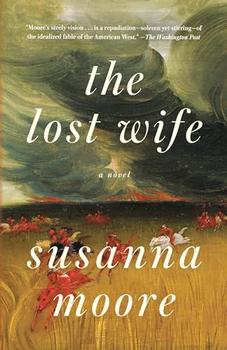Summary | Excerpt | Reviews | Beyond the Book | Readalikes | Genres & Themes | Author Bio

A novel
by Susanna Moore
There were three unhitched wagons, their canvas roofs unfurled. The arched frames looked like the rib cages of dinosaurs. Next to the yard where the wagons were kept were two large pens, one with eight horses and the other holding four oxen. The smell was very strong. I made myself a bed in one of the wagons, using my cape as a pillow.
In the morning, I was awakened by the lurching of the wagon as it was pulled into the street. A Negro man climbed over the side, tying what looked like a canvas sail to the frame, all the while talking to himself. Boys led the horses into the street and hitched four of them to the wagon. The men paid me no mind, laughing and joking as they worked. One boy showed off to a girl in the street by punching a horse in its face.
By the time the other passengers began to arrive, I had claimed my seat. I soon found myself wedged between a husband and wife and their two sickly children, and a salesman who held tightly to a wicker sample case for the entire journey. I offered to help with their youngest child, a two-year-old girl, her face matted with dried snot, but the mother shook her head, holding the child out of reach as though I might snatch her away. I kept to myself then, only speaking when necessary, not in need of anyone's companionship or aid. If questioned, I said I was from Philadelphia. Just in case. Ank has tracked me down before.
The wagons were packed with children and cats and dogs and cages of chickens and furniture and farm tools and oaken casks, as well as every possession thought necessary for a new life in the West, many of them unnecessary, at least to my mind. A waffle iron tied to a child's coffin, and an album of pressed flowers. Perhaps I am unfair. Perhaps that is just what is needed.
Only the children and elderly remained in the wagons when the road led uphill or down, or when the road was too rough, or the horses were changed, the rest of us walking alongside. There were no springs in the wagons, and each rut and ditch in the road made the children cry and the old people bend double in pain. I had not expected the journey to be pleasurable, but I hadn't imagined that it would be quite so bad.
Most people ran out of food before we reached the Mississippi. I'd bought a bag of Michigan cherries, a punnet of green plums, half a loaf of rye bread, and some rotten cheese which was meant to last me five days, but I'd eaten it all by the third day. An elderly Norwegian woman who was traveling to meet her son in Wisconsin offered to share what was left of her provisions, hard biscuits and a bag of dried apples, but it was not enough for both of us, and I ate only a handful now and then, pretending that I was full. At night, I spread my cape under the wagon, having seen lice on the children, and wanting to leave room for the old woman, but it was difficult to sleep with the groans and sobs of my fellow travelers.
We at last reached Galena, bad-tempered and dirty. The old woman was so rattled, so stiff from the journey I had to ask the help of another passenger, a stout man with a cork leg, to lift her from the wagon. I lost her in the crowd and I am ashamed to say I did not try to find her.
At the steamboat office, I bought a ticket to Shakopee, Minnesota on a riverboat named The Greek Slave. The trip upriver will take six days. I spent a half dollar for two bags of pears and some cider and a honey cake on the dock, and washed my face and hands in a pump in the street.
* * *
The Galena River is more a wide stream than a river, emptying into the Mississippi thirteen miles southwest of the town. The boat is meant for stock rather than passengers, and freight rather than stock. I sleep in a slatted chair in the bow, the hem of my dress stiff with dried mud, which has the advantage of keeping my legs warm at night. My cape covers the rest of me, including my head. Even so, my face and hands are swollen with mosquito bites. There are rats, too, and I keep my feet tucked under me. The cattle, trapped in their sodden pens, moan through the night.
Excerpted from The Lost Wife by Susanna Moore. Copyright © 2023 by Susanna Moore. All rights reserved. No part of this excerpt may be reproduced or reprinted without permission in writing from the publisher.
You can lead a man to Congress, but you can't make him think.
Click Here to find out who said this, as well as discovering other famous literary quotes!
Your guide toexceptional books
BookBrowse seeks out and recommends the best in contemporary fiction and nonfiction—books that not only engage and entertain but also deepen our understanding of ourselves and the world around us.